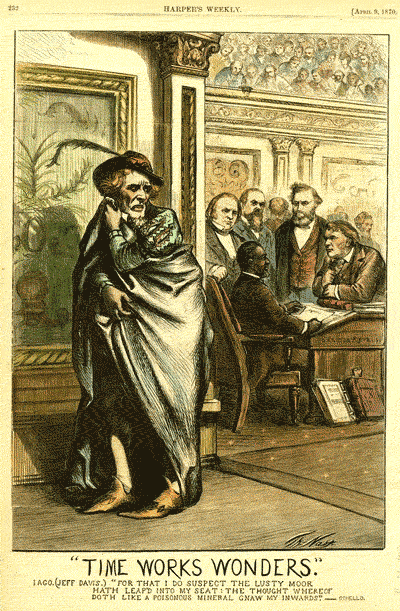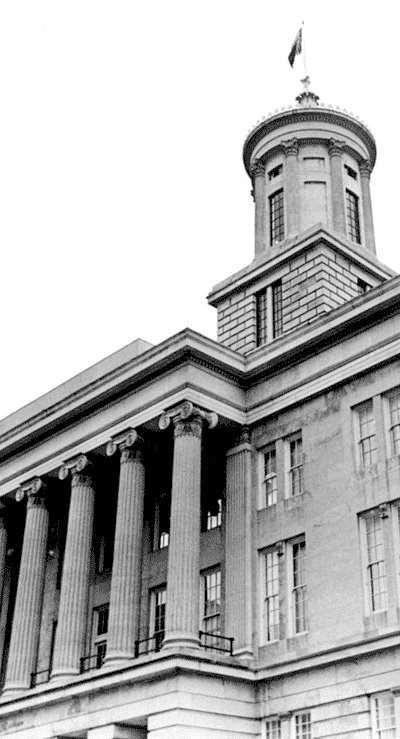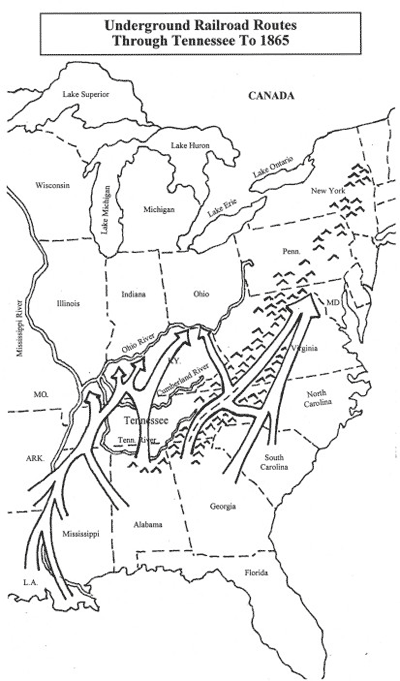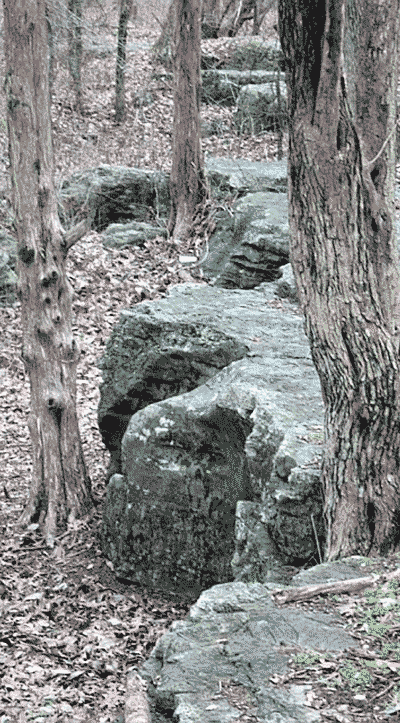Documents

Hiram Rhodes Revels was the first person of color to serve in the U.S. Senate. He took the seat formerly held by Jefferson Davis, pictured here as Iago from Shakespeare's Othello.
(Harper's Weekly cartoon, Feb. 19, 1870, from TSLA collection)
General Information
"The first African American to be elected to the Tennessee House of Representatives after Reconstruction was civil rights lawyer and businessman Archie Walter (A. W.) Willis Jr. (D, Memphis), elected in 1964....read more."
1775 Lord Dunmore's Proclamation
"By His Excellency the Right Honorable JOHN Earl of DUNMORE, His Majesty's Lieutenant and Governor General of the Colony and Dominion of VIRGINIA, and Vice Admiral of the same....read more."
1775 Virginia Declaration
"WHEREAS lord Dunmore, by his proclamation, dated on board the ship William, off Norfolk, the 7th day of November 1775, hath offered freedom to such able-bodied slaves as are willing to join him, and take up arms, against the good people of this colony, giving thereby....read more."
1776 Declaration of Independence Draft
"We hold these truths to be sacred & undeniable, that all men are created equal & independant; that from that equal creation they derive rights inherent & inalienable, among which are the preservation of life, & liberty, & the pursuit of happiness....read more."
1777 Vermont Constitution
"And whereas, the inhabitants of this State have (in consideration of protection only) heretofore acknowledged allegiance to the King of Great Britain, and the said King has not only withdrawn that protection, but commenced, and still continues to carry on, with unabated vengeance, a most cruel and unjust....read more."
1864 Wilmont Proviso
"Provided, That, as an express and fundamental condition to the acquisition of any territory from the Republic of Mexico by the United States, by virtue of any treaty which may be negotiated between them, and to the use by....read more."
1857 Lecompton Constitution
"SECTION 1. The right of property is before and higher than any constitutional sanction, and the right of the owner of a slave to such slave and its increase is the same and as inviolable as the right of the owner of any....read more."
1862 Morrill Act
"Sec. 2. And be it further enacted, That the land aforesaid, after being surveyed, shall be apportioned to the several States in sections or subdivisions of sections, not less than one quarter of a section; and whenever there are public lands in a State subject to sale at private entry at one dollar and twenty-five cents per acre....read more."
1863 Emancipation Proclamation
"That on the first day of January, in the year of our Lord one thousand eight hundred and sixty-three, all persons held as slaves within any State or designated part of a State, the people whereof shall then be in rebellion against the United States, shall be then, thenceforward, and forever free; and the Executive Government of the United States....read more."
1863 Proclamation of Amnesty and Reconstruction
"Whereas, with reference to said rebellion and treason, laws have been enacted by Congress, declaring forfeitures and confiscation of property and liberation of slaves, all upon terms and conditions therein stated, and also declaring that the President was thereby authorized at any time thereafter, by proclamation, to extend to persons....read more."
1864 Wade-Davis Bill
"Be it enacted by the Senate and House of Representatives of the United States of America in Congress assembled, That in the states declared in rebellion against the United States, the President shall, by and with the advice and consent of the Senate, appoint for each a provisiona1 governor, whose pay and emoluments shall not exceed that of a brigadier-general of volunteers....read more."

Tennessee State Capitol, Nashville, Tennessee (TSLA)

1865 13th Amendment
"Section 1. Neither slavery nor involuntary servitude, except as a punishment for crime whereof the party shall have been duly convicted, shall exist within the United States, or any place subject to their jurisdiction....read more."
1865 Johnson's Amnesty Proclamation
"Whereas, the President of the United States, on the 8th day of December, A.D., 1863, and on the 26th day of March, A.D., 1864, did, with the object to suppress the existing rebellion, to induce all persons to return to their loyalty, and to restore the authority of the United States, issue proclamations offering amnesty and pardon to...read more."
1865 Mississippi's Black Codes
"Section 1. All freedmen, free negroes and mulattoes may sue and be sued, implead and be impleaded, in all the courts of law and equity of this State, and may acquire personal property, and choses in action, by descent or purchase, and may dispose of the same in the same manner and to the same extent that white persons may....read more."
1865 Sherman's Field Order No. 15
"The islands from Charleston south, the abandoned rice fields along the rivers for thirty miles back from the sea, and the country bordering the St. John’s River, Florida, are reserved and set apart for the settlement of the negroes now made free by the acts of war and the [Emancipation] proclamation of the President of the United States....read more."
1866 Civil Rights Act
"Be it enacted by the Senate and House of Representatives of the United States of America in Congress assembled, That all persons born in the United States and not subject to any foreign power, excluding Indians not taxed, are hereby declared to be citizens of the United States; and such citizens....read more."
1867 Second Reconstruction Act
"Be it enacted, &c., That before the first day of September, eighteen hundred and sixty-seven, the commanding general in each district defined by an act entitled "An Act to provide for the more efficient government of the rebel States," passed March second, eighteen hundred and sixty-seven, shall cause a registration to be made of the male citizens of the United States....read more."
1868 14th Amendment
"Section. 1. All persons born or naturalized in the United States and subject to the jurisdiction thereof, are citizens of the United States and of the State wherein they reside. No State shall make or enforce any law which shall abridge the privileges or immunities of citizens of the United States; nor shall any State deprive any person of life, liberty, or property....read more."
1870 15th Amendment
"Section. 1. The right of citizens of the United States to vote shall not be denied or abridged by the United States or by any State on account of race, color, or previous condition of servitude....read more."
1870 First Enforcement Act
"SEC. 2. And be it further enacted, That it shall be the duty of every person and officer to give to all citizens of the United States the same and equal opportunity to perform [any] prerequisite, and to become qualified to vote without distinction of race, color, or previous condition of servitude; and if any person or officer shall refuse or knowingly omit to give full effect....read more."
1875 Chapter 130, Act of TN
"Be it enacted by the General Assembly of the state of Tennessee – That the rule of the Common Law giving a right of action to any person excluded from any Hotel or public means of transportation or place of amusement, is hereby abrogated, and hereafter no keeper of any Hotel or public House, or carrier of passengers for hire....read more."

Scene at Stones River National Battlefield, Murfreesboro, Tennessee
(photo by Kathy Lauder)

1875 Chapter 90, Acts of TN
"Section 1. Be it enacted by the General Assembly of the State of Tennessee. That the establishment of a Normal School or Schools is hereby authorized to be effected by the Board of Education, hereinafter provided for. The said Normal School or Schools shall be made in every respect first-class institutions for the professional education of teachers, and that the most approved methods of instruction....read more.
1875 Civil Rights Act
"Be it enacted by the Senate and House of Representatives of the United States of America in Congress assembled, That all persons within the jurisdiction of the United States shall be entitled to the full and equal enjoyment of the accommodations, advantages, facilities, and privileges of inns, public conveyances on land or water, theaters, and other places of public amusement....read more.
1887 S. A. McElwee Speech against Lynching
"Mr. Speaker, and Gentlemen of the House of Representatives: This is a very important bill and ought to arrest the attention of every member of this house. I desire in a few brief remarks to give my reasons for asking for the passage of this bill, and I trust you will hear me patiently for my country’s cause. In this age of Christian civilization, and educated as we are in religious institutions, surely there is no one in this body who will oppose a measure that seeks to prevent mob violence in the state of Tennessee. This bill seeks to prevent a great and growing evil in our state and punish those who take the law into their own hands and render a verdict without trial or jury. Mobs under any and all circumstances are wrong, and the strong arm of the law should take hold of the participants and punish them severely. In speaking of my opposition to mob violence....read more.
1898 Louisiana Grandfather Clause
"[Article 197] Sec. 3. He [the elector] shall be able to read and write, and shall demonstrate his ability to do so when he applies for registration, by making, under oath administered by the registration officer or his deputy, written application therefor, in the English language, or his mother tongue, which application shall contain the essential facts necessary to show that he is entitled to register and vote, and shall be entirely written, dated and signed by him, in the presence of the registration officer or his deputy, without assistance or suggestion from any person or any memorandum whatever, except the form of application....read more.
